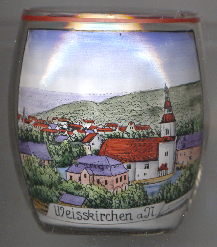

|
| ČESKÁ REPUBLIKA | CZECH REPUBLIC |
| Liberecký kraj | Liberec region |
| Okres: Liberec |
Bílý Kostel nad Nisou (German: Weißkirchen an der Neiße; both name literally meaning 'Whitechurch upon Nisa/Neiße') is situated at an elevation of 275 m on the river (Lužická) Nisa (Lausitzer Neiß), about 12 km northwest of the district town Liberec. The municipality has a population of about 1,100 (2023).
 It is believed that the area, covered by dense forests, was first settled by the Slavic Milzenians in the 8th and 9th centuries.
The present-day settlement emerged in the 13th century during the German colonization of Bohemia under the Přemyslids.
The place was first mentioned in written documents dating from 1352 as Alba Ecclesia, i.e. 'white church'. From the
13th century onwards, mining of iron, copper, silver, and lead ore took place. This mining activity reached its peak around
1470. In 1773, an attempt to resume ore mining was unsuccessful. Instead, calcite mining began. Industrialization began in the
second third of the 19th century, and the first textile factory was built in 1836. In 1842, a wooden bridge was built over
the Neiße River, on which tolls were levied from 1848. After the abolition of patrimonial rule, Weisskirchen, along with
the districts of Bäckenhain (Pekařka), Freudenhöh (Na&nsp;Roškoši), and Frauenberg (Panenská
Hůrka), from 1850 onward formed a political municipality in the judicial district Kratzau (Chrastava) within the district
Reichenberg (Liberec). In 1916, the official name of the municipality was expanded to Weisskirchen an der Neisse / Bílý
Kostel nad Nisou. As a result of the Munich Agreement, Weißkirchen an der Neiße was annexed
to the German Reich in 1938. After the end of World War II, the town was returned to Czechoslovakia. Subsequently, the German
population was expelled. From 1980 to 1990, Bílý Kostel was incorporated into Chrastava, but since then again is an
independent municipality.
It is believed that the area, covered by dense forests, was first settled by the Slavic Milzenians in the 8th and 9th centuries.
The present-day settlement emerged in the 13th century during the German colonization of Bohemia under the Přemyslids.
The place was first mentioned in written documents dating from 1352 as Alba Ecclesia, i.e. 'white church'. From the
13th century onwards, mining of iron, copper, silver, and lead ore took place. This mining activity reached its peak around
1470. In 1773, an attempt to resume ore mining was unsuccessful. Instead, calcite mining began. Industrialization began in the
second third of the 19th century, and the first textile factory was built in 1836. In 1842, a wooden bridge was built over
the Neiße River, on which tolls were levied from 1848. After the abolition of patrimonial rule, Weisskirchen, along with
the districts of Bäckenhain (Pekařka), Freudenhöh (Na&nsp;Roškoši), and Frauenberg (Panenská
Hůrka), from 1850 onward formed a political municipality in the judicial district Kratzau (Chrastava) within the district
Reichenberg (Liberec). In 1916, the official name of the municipality was expanded to Weisskirchen an der Neisse / Bílý
Kostel nad Nisou. As a result of the Munich Agreement, Weißkirchen an der Neiße was annexed
to the German Reich in 1938. After the end of World War II, the town was returned to Czechoslovakia. Subsequently, the German
population was expelled. From 1980 to 1990, Bílý Kostel was incorporated into Chrastava, but since then again is an
independent municipality.
The  church of St. Nicholas [foreground right] was built in the 17th century.
The church tower was erected in 1679 and received its present Baroque form in 1732.
church of St. Nicholas [foreground right] was built in the 17th century.
The church tower was erected in 1679 and received its present Baroque form in 1732.
[https://de.wikipedia.org/wiki/B%C3%ADl%C3%BD_Kostel_nad_Nisou]
![[scale]](lineal.jpg)